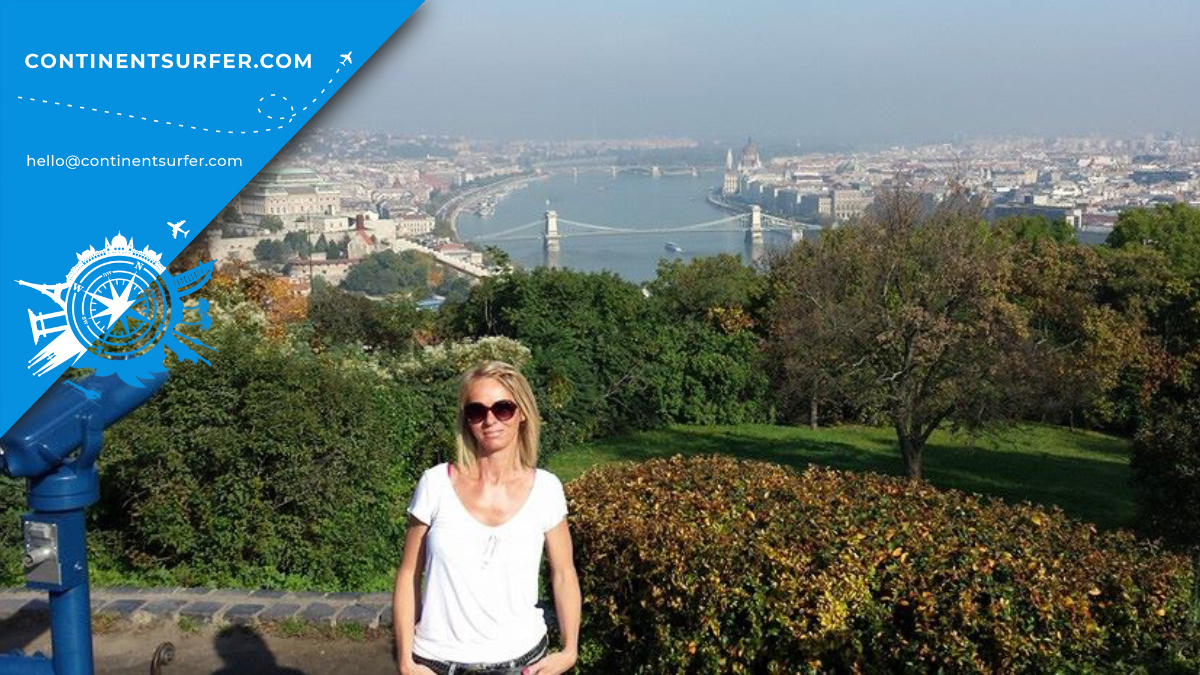Australia or Hungary? A story of finding home
Anita is a truly cosmopolitan Hungarian. She spent twenty years abroad and is now an Australian citizen. How do she and her foreign partner see Hungary?
Here’s some of what they told us!
written by: Mea Barath – Continent Surfer
Anita quickly got a taste of life in a foreign country. Straight after university, – as an adventurous young person with no language skills, – she obtained a visa to England as a nanny. Back then, she lived entirely by her dictionary, which she carried with her everywhere.
It seemed a bold venture!
Soon she continued her overseas adventures in the USA on a student exchange programme. Later, after a short stint in her home country, in Hungary, the next destination was Australia.
Anita still lives with her family in Hastings, Victoria, on the Mornington Peninsula, 55 kilometres from Melbourne, in a small town of 15,000 people. It’s a very homely place for Anita as it is similar in size to her home town and also to the town, where she went to university.
“I’m a real Aquarius, the water is my life. I have to live somewhere by the sea!” – says the cosmopolitan Hungarian.
When asked which country she really feels at home in, Anita has a clear answer:
“Home for me is definitely Australia! And as strange as it may sound, this is where I grew up. It’s where I really became independent and built my own life”.
Meeting people and dating in Australia
Anita and her Australian partner, Matt, met online on a dating website. After about a year of dating, he asked her to be his girlfriend. “That’s an interesting part of relationships,” says Anita. – Anita says.
“In Hungary, we say ‘dating’ when two people go out, and that is it. In Australia, there are all sorts of labels and phrases for a relationship.”

Dating = going out on dates
Hooking up = actually sleeping together
Going out = the girlfriend and boyfriend kind of thing
Anita came to Australia with a Hungarian friend she met at the orientation of the USA student exchange programme, and their friendship has remained strong to this day.
“During the integration process, in the first years we were looking for our folks at some point, and there was a pretty nice hungarian community who used to get together in a belgian bar in Melbourne. It was typical to meet and date within the group, a lot of hungarian girls just preferred meeting with hungarian boys. That was not the case for me. I wanted to experience something different, something new, and I was open to meeting new people.
Anita and Matt have been together for twelve years and have supported each other through thick and thin. In their fifth year together, they suddenly decided to move to Hungary.
Hungary… why?
The idea of moving back to Hungary was Matt’s.
“When we met, in 2011, I had just started the police academy in Australia. This opportunity has always provided us with a very good, relaxed family background. It wasn’t a problem that I ended up working three shifts. We had a good relationship. We travelled a lot together – and still do. Every year we went to Thailand, Bali, Vietnam. Kuala Lumpur, Singapore, basically everywhere in Asia. Travelling within Australia is unfortunately more expensive than going abroad on holiday.”
They returned home to Hungary in the summer of 2014. That was the very first real time Matt got a taste of Anita’s home country. They also travelled around Europe a lot. In addition to Anita’s hometown and the capital of Hungary, Budapest, they visited Croatia, the Czech Republic and Slovakia. Matt was fascinated by the diversity of Europe and its cheapness. Matt knew that he wanted to see more of the world.
“Matt worked for one of Australia’s biggest drinks chains, Dan Murphy’s, and after leaving his job couldn’t find his place. I was working as a detective.” – Anita says. “I enjoyed being a policeman and we were financially stable. When he put forward the idea of trying out what it would be like to live in Hungary in retirement, I had no reason to say no.”
So, they decided to go for it!
The move
As soon as they decided to move to Hungary, they started making preparations. Anita took 12 months unpaid leave from her job, got rid of most of their belongings at a huge garage sale, sold their car and set off.
Well, they would have, but Matt needed a visa.
Arranging a visa in Hungary for a non-EU citizen
Before moving to Hungary, Anita and Matt first tried to find out what they needed to do online without the help of an immigration agent. It proved to be very difficult.
In 2016, to enter Hungary as an Australian citizen, you could apply for a “Hungarian citizen family member residence card”. As Anita and Matt are not married, they had to prove that they had been living together for at least a year. They continued to receive regular visits from the office to their Hungarian home to verify the authenticity of their relationship.
They also encountered difficulties at the immigration office. Matt was asked for an Australian address card, which does not exist in Australia. In the end, the address on his driving licence was accepted as sufficient proof. Matt was also repeatedly asked if he was of Ukrainian origin, as there had never really been an example of an Australian citizen choosing Hungary as a long-term residence.
After submitting numerous official documents and three months of paperwork, Matt was granted a five-year residence permit and the rights of a European Union citizen. Little did they know at the time that, contrary to their plans, these five years would actually be spent on Hungarian soil. Matt was then able to get a job, which he did. But it was not an easy ride for him.
Working as a foreigner in Hungary
In Matt’s experience, Hungarian employers are wary of foreign jobseekers, especially if they are not EU nationals. He has received many rejections or no replies, which he has also been surprised and saddened him.
He eventually got a job as an innovation manager at Tesco and worked there for a year. He did not really develop close working relationships and experienced an unfriendly atmosphere. His job required him to travel to England regularly. He enrolled on a Hungarian language course and made many foreign friends.
Anita used her routine and experience of the complexities of Matt’s stay in Hungary to apply for a job as an immigration officer, which she held for three years. She is pleased and proud to have helped issue hundreds of foreign residence permits.
Anita and Matt’s plans were overtaken by the Covid-19 epidemic and their one-year stay in Hungary became five years.
Instead of a one-year trip to Hungary, it was ‘an uncertain five-year plan’.
An Australian’s experience of Hungary
Matt’s experiences in Hungary are very mixed. Being forced to stay tipped the scales towards negative experiences, as the situation was not of his choosing and could not be changed.
His lack of knowledge of the local language was a major challenge as a foreigner living in Hungary. Matt experienced isolation, especially during his time in the. countryside, where people around him did not really speak English. Moving to Budapest, the more vibrant social life and multicultural environment eased this difficulty.
In the workplace, he found the inefficiencies of the Hungarian system of manager-employee relations difficult to understand and particularly damaging.
Matt sees Hungarians as ‘sour.‘
Anita says that through Matt’s eyes, Hungarians are a very depressing sight. “People walk the streets looking sad, looking at you strangely. If you don’t know them, they even stare at you. If you speak English in a café, you don’t’ fit in. You often get the feeling that you have no business being in this country.” – added Matt.
The challenges of learning Hungarian
For Matt, learning the notoriously difficult Hungarian language has proved to be an insurmountable challenge. He went to language schools, private tutors, and Anita tried to help and teach him. After three years, his vocabulary is still minimal. He generally understands the content of conversations, but he is not good at two-way communication. Pronunciation Hungarian words was also very difficult for him.
Was the move worth it?
Anita no longer feels that she belongs in Hungary. She has only spent some time here. Her life is elsewhere now, her home has become Australia. But she doesn’t regret giving those five years to Hungary.
“I would like to believe that I have left some kind of a good mark in the lives of many people.”
“During my time in Hungary, I was lucky enough to be able to rely on my family. We owe a lot to my mother and my sister. The experiences we shared will stay with me. My godchildren grew up to be primary school pupils in front of my eyes.

“Matt has a bond with them, I think he has left a good mark on them too. The smiles, the happiness, the little joys, the feeling of having everything to be thankful for, and the experience of knowing how to give, for sure!”

Like what we do?
If so, please support us, every little counts and is much appreciated!
You will help us to come up with useful information regularly, so please support us every once and a while or even monthly! Thank you!
Source(s):
Original article: Ausztrália vagy Magyarország? Egy otthonra találás története Translated by: Bogi – CONTINENT SURFER

Planning to move abroad? Interested in professional advice or personal experiences?
Surf on our website and become a real Continent Surfer!
GET ALL THE HELP YOU NEED from our professional consultants, visa advisor, language teachers and other service providers.
England, Australia, Europe, America New Zealand, Asia or Canada?
Wherever you go, whatever solution you might be looking for… WE ARE HERE TO HELP!
Click here to contact our Expert Partners!
Comment

